As pools have become less expensive in recent years they have also become more popular, which means the demand for pool cleaning services is also on the rise. This explains why the number of US pool cleaning businesses has increased 7% annually since 2016 to top 80,000, according to market analyst IBISWorld.
Yet still the US’ 10 million residential pools and more than 300,000 public pools struggle to find reliable cleaners, so there’s still money out there for quality service. Cleaning pools may not be the most glamorous line of work, but that’s one reason it offers real opportunity: because not everybody is willing to get their hands dirty!
Of course, starting a business is never easy. Fortunately, you’ve come to the right place, as this step-by-step guide will walk you through the launch and development process and set you on the road to cleaning up in the pool servicing industry.
Step 1: Decide if the Business Is Right for You
There’s more to being a pool cleaner than just showing up and wiping things down. Here are a few things you need to know for a successful launch.
Pros and cons
Like any business, pool cleaning has its pros and cons.
Pros
- Low startup costs
- Work outdoors, catch some rays
- You’re the boss — choose your hours and clients
Cons
- Seasonal work in most areas
- Physical, tedious work can limit your motivation
- Some training required
Pool Cleaning Industry Trends
Market analyst IBISWorld foresees continued market expansion as the number of pool owners increase along with interest in pool care and additional services.
Industry size and growth
Trends and challenges
The latest trends in pool cleaning include:
- Use of robotic pool cleaning machines
- Sanitization options like salt chlorine generators and AOP systems are gaining popularity
Challenges faced by pool cleaners are:
- Supply chain problems
- Labor shortage
Demand hotspots
What kind of people work in pool cleaning?
How much does it cost to start a pool cleaning business?
The startup costs for a pool cleaning company can vary depending on the pool care service you want to operate. While the initial capital needed can be as little as $2,000, you probably want to set aside at least $8,500 to get your business off the ground.
A significant portion of the capital goes toward equipment. You’ll need a handful of items to successfully launch your pool cleaning business. Here’s a list to help you get started:
- Skimmers and brushes
- Water testing kit
- Pool cleaning chemicals
- Leaf rakes
- Vacuum
- Truck or SUV to transport your equipment
- Or a trailer for a smaller vehicle
- Invoice book, contract, and pricing sheets
Here’s a minimum startup cost breakdown for a pool cleaning business:
| Start-up Costs | Ballpark Range | Average |
| Setting up a business name and corporation | $150 - $200 | 175 |
| Business licenses and permits | $100 - $300 | 200 |
| Business cards and brochures | $200 - $300 | 250 |
| Used truck | $2,000 - $5,000 | 3500 |
| Tools and supplies | $2,000 - $3,000 | $2,500 |
| Insurance | $100 - $300 | 200 |
| Website setup | $1,000 - $3,000 | 2000 |
| Total | $5,550 - $12,100 | $8,850 |
Recurring annual costs include insurance, permits, and marketing. You’ll also need to regularly replenish your cleaning supplies.
How much can you earn from a pool cleaning business?
Pool cleaners generally charge $80 to $100 per hour, or as much as $200 per hour if you also offer pool maintenance and repair. But your ability to complete jobs quickly and the number of new customers you gain every month will determine your income.
In your first year or two, you could work from home and confirm 150 3-hour bookings per year. At $80 per hour, you’ll be bringing in $36,000 in annual revenue. This would mean around $29,000 in profit, assuming an 80% margin. As you gain more clients, bookings could climb to 250 per year. At this stage, you’d raise your fee to $100 per hour and hire staff, reducing your profit margin to around 50%. With annual revenue of $75,000, you’d make a tidy profit of $37,000.
What barriers to entry are there?
Starting a swimming pool cleaning business is pretty straightforward. But in some states, you can’t just decide to venture into the pool industry. You’ll need to be certified and undergo training before you’re allowed to clean residential or commercial pools. So it’s a good idea to get some training before you venture into this industry.
Before you become a pool technician, you could start by offering simple cleaning services such as skimming debris out of the water as you continue to hone your skills.
Related Business Ideas
If you’re still not sure whether this business idea is the right choice for you, here are some related business opportunities to help you on your path to entrepreneurial success.
Step 2: Hone Your Idea
With the basics out of the way, it’s time to lay the groundwork for a successful launch.
Why? Identify an opportunity
Your direct competitors will be established cleaning companies in your area, and you could further narrow down by service or niche. For instance, if you clean commercial pools, you’ll be competing against companies targeting the same types of pools.
Research your competition to review their service offerings and prices and consider what you might do better. Ideally, you want to target an underserved segment of the market. It might help to narrow your focus to increase the chances of getting a foothold in the market and being able to build a reputation.
What? Determine your products or services
The pool cleaning business falls into two broad categories – cleaning and repair/maintenance. It makes perfect sense to decide which one you want to pursue early on to increase your chances of success.
Pool maintenance includes testing water pH levels, cleaning filter cartridges, checking water levels, vacuuming the pool bottom, and skimming debris from the surface.
Repair and replacement include fixing cracks and leaks in the pool structure, fitting and repairing pipes in pools and spas, replacing underwater lights, and fixing faulty pool cleaning equipment.
Nailing down a niche makes it easier for you to determine your potential customer, which in turn enables you to choose the best marketing strategy.
How much should you charge for pool cleaning?
As stated above, the hourly charge to clean pools runs from $80 to $100. But pool cleaning prices often differ from one task to another. So, it would be best if you considered several factors before you determine how much you’ll charge, such as:
- The type of pool
- The number of hours needed to finish the job
- The location of the pool
- Chemical costs
- Fuel cost
We recommend you inspect the pool before giving a quote.
Once you know your costs, you can use this Step By Step profit margin calculator to determine your mark-up and final price points. Remember, the prices you use at launch should be subject to change if warranted by the market.
Who? Identify your target market
Once you’ve decided which segment of the market you want to pursue, the next step is to identify your target market, or typical customer. If you decide to focus on residential cleaning, your target market will be successful professionals and family homes often found in high-end suburbs.
If you choose to service businesses, potential commercial clients might include recreation centers, hotels, gyms, apartment complexes, and spas.
Where? Choose your business premises
Since you’re not going to be driving hundreds of miles to clean a pool, the location of your pool cleaning business has a direct impact on your service area and potential customers.
In Florida, for instance, you’ll be able to clean and service a variety of pools year-round, while in New York you’ll mostly be working on indoor residential pools and spas, due to seasonal weather patterns.
As a rule of thumb, you’re better off locating your business in an area with a high concentration of pools.
In the early stages, you may want to run your business from home to keep costs low. But as your business grows, you’ll likely need to hire workers for various roles and may need to rent out an office. You can find commercial space to rent in your area on sites such as Craigslist, Crexi, and Instant Offices.
When choosing a commercial space, you may want to follow these rules of thumb:
- Central location accessible via public transport
- Ventilated and spacious, with good natural light
- Flexible lease that can be extended as your business grows
- Ready-to-use space with no major renovations or repairs needed
Step 3: Brainstorm a Business Name
Your business name is your business identity, so choose one that encapsulates your objectives, services, and mission in just a few words. You probably want a name that’s short and easy to remember, since much of your business, and your initial business in particular, will come from word-of-mouth referrals.
Here are some ideas for brainstorming your business name:
- Short, unique, and catchy names tend to stand out
- Names that are easy to say and spell tend to do better
- The name should be relevant to your product or service offerings
- Ask around — family, friends, colleagues, social media — for suggestions
- Including keywords, such as “pools” or “cleaning”, boosts SEO
- Choose a name that allows for expansion: “Jim’s Bakery” over “Jim’s Cookies”
- Avoid location-based names that might hinder future expansion
- Use online tools like the Step by Step business name generator. Just type in a few keywords and hit “generate” and you’ll have dozens of suggestions at your fingertips.
Once you’ve got a list of potential names, visit the website of the US Patent and Trademark Office to make sure they are available for registration and check the availability of related domain names using our Domain Name Search tool. Using “.com” or “.org” sharply increases credibility, so it’s best to focus on these.
Finally, make your choice among the names that pass this screening and go ahead with domain registration and social media account creation. Your business name is one of the key differentiators that set your business apart. Once you pick your company name, and start with the branding, it is hard to change the business name. Therefore, it’s important to carefully consider your choice before you start a business entity.
Step 4: Create a Business Plan
Every business needs a plan. This will function as a guidebook to take your startup through the launch process and maintain focus on your key goals. A business plan also enables potential partners and investors to better understand your company and its vision:
- Executive Summary: Brief overview of the entire business plan; should be written after the plan is complete.
- Business Overview: Overview of the company, vision, mission, ownership, and corporate goals.
- Product and Services: Describe your cleaning services in detail.
- Market Analysis: Assess market trends such as variations in demand and prospects for growth, and do a SWOT analysis.
- Competitive Analysis: Analyze main competitors, assess their strengths and weaknesses, and create a list of the advantages of your services.
- Sales and Marketing: Examine your companies’ unique selling propositions (USPs) and develop sales, marketing, and promotional strategies.
- Management Team: Overview of management team, detailing their roles and professional background, along with a corporate hierarchy.
- Operations Plan: Your company’s operational plan includes procurement, office location, key assets and equipment, and other logistical details.
- Financial Plan: Three years of financial planning, including startup costs, break-even analysis, profit and loss estimates, cash flow, and balance sheet.
- Appendix: Include any additional financial or business-related documents.
If you’ve never created a business plan, it can be an intimidating task. You might consider hiring a business plan specialist at Fiverr to create a top-notch business plan for you.
Step 5: Register Your Business
Registering your business is an absolutely crucial step — it’s the prerequisite to paying taxes, raising capital, opening a bank account, and other guideposts on the road to getting a business up and running.
Plus, registration is exciting because it makes the entire process official. Once it’s complete, you’ll have your own business!
Choose where to register your company
Your business location is important because it can affect taxes, legal requirements, and revenue. Most people will register their business in the state where they live, but if you are planning to expand, you might consider looking elsewhere, as some states could offer real advantages when it comes to servicing pools.
If you’re willing to move, you could really maximize your business! Keep in mind, it’s relatively easy to transfer your business to another state.
Choose your business structure
Business entities come in several varieties, each with its pros and cons. The legal structure you choose for your pool service will shape your taxes, personal liability, and business registration requirements, so choose wisely.
Here are the main options:
- Sole Proprietorship – The most common structure for small businesses makes no legal distinction between company and owner. All income goes to the owner, who’s also liable for any debts, losses, or liabilities incurred by the business. The owner pays taxes on business income on his or her personal tax return.
- General Partnership – Similar to a sole proprietorship, but for two or more people. Again, owners keep the profits and are liable for losses. The partners pay taxes on their share of business income on their personal tax returns.
- Limited Liability Company (LLC) – Combines the characteristics of corporations with those of sole proprietorships or partnerships. Again, the owners are not personally liable for debts.
- C Corp – Under this structure, the business is a distinct legal entity and the owner or owners are not personally liable for its debts. Owners take profits through shareholder dividends, rather than directly. The corporation pays taxes, and owners pay taxes on their dividends, which is sometimes referred to as double taxation.
- S Corp – An S-Corporation refers to the tax classification of the business but is not a business entity. An S-Corp can be either a corporation or an LLC, which just needs to elect to be an S-Corp for tax status. In an S-Corp, income is passed through directly to shareholders, who pay taxes on their share of business income on their personal tax returns.
We recommend that new business owners choose LLC as it offers liability protection and pass-through taxation while being simpler to form than a corporation. You can form an LLC in as little as five minutes using ZenBusiness’s online LLC formation service. They will check that your business name is available before filing, submit your articles of organization, and answer any questions you might have.
Step 6: Register for Taxes
The final step before you’re able to pay taxes is getting an Employer Identification Number, or EIN. You can file for your EIN online or by mail or fax: visit the IRS website to learn more. Keep in mind, if you’ve chosen to be a sole proprietorship you can simply use your social security number as your EIN.
Once you have your EIN, you’ll need to choose your tax year. Financially speaking, your business will operate in a calendar year (January–December) or a fiscal year, a 12-month period that can start in any month. This will determine your tax cycle, while your business structure will determine which taxes you’ll pay.
It is important to consult an accountant or other professional to help you with your taxes to ensure you are completing them correctly.
Step 7: Fund your Business
Securing financing is your next step and there are plenty of ways to raise capital:
- Bank loans: This is the most common method, but getting approved requires a rock-solid business plan and strong credit history.
- SBA-guaranteed loans: The Small Business Administration can act as guarantor, helping gain that elusive bank approval via an SBA-guaranteed loan.
- Government grants: A handful of financial assistance programs help fund entrepreneurs. Visit Grants.gov to learn which might work for you.
- Venture capital: Offer potential investors an ownership stake in exchange for funds, keeping in mind that you would be sacrificing some control over your business.
- Friends and Family: Reach out to friends and family to provide a business loan or investment in your concept. It’s a good idea to have legal advice when doing so because SEC regulations apply.
- Crowdfunding: Websites like Kickstarter and Indiegogo offer an increasingly popular low-risk option, in which donors fund your vision. Entrepreneurial crowdfunding sites like Fundable and WeFunder enable multiple investors to fund your business.
- Personal: Self-fund your business via your savings or the sale of property or other assets.
Bank and SBA loans are probably the best options, other than friends and family, for funding a pool cleaning business.
Step 8: Apply for Licenses/Permits
Starting a pool cleaning business requires obtaining a number of licenses and permits from local, state, and federal governments.
To be a commercial pool cleaner, you’ll need to be a certified technician. In essence, this means you’ll take a certification program consisting of 15 hours of training and an exam. If you want to offer repair and replacement services for parts like pool railings, filters, or piping, you’ll need to apply for a contractor’s license.
Federal regulations, licenses, and permits associated with starting your business include doing business as (DBA), health licenses and permits from the Occupational Safety and Health Administration (OSHA), trademarks, copyrights, patents, and other intellectual properties, as well as industry-specific licenses and permits.
You may also need state-level and local county or city-based licenses and permits. The license requirements and how to obtain them vary, so check the websites of your state, city, and county governments or contact the appropriate person to learn more.
You could also check this SBA guide for your state’s requirements, but we recommend using MyCorporation’s Business License Compliance Package. They will research the exact forms you need for your business and state and provide them to ensure you’re fully compliant.
This is not a step to be taken lightly, as failing to comply with legal requirements can result in hefty penalties.
If you feel overwhelmed by this step or don’t know how to begin, it might be a good idea to hire a professional to help you check all the legal boxes.
Step 9: Open a Business Bank Account
Before you start making money you’ll need a place to keep it, and that requires opening a bank account.
Keeping your business finances separate from your personal account makes it easy to file taxes and track your company’s income, so it’s worth doing even if you’re running your pool cleaning business as a sole proprietorship. Opening a business bank account is quite simple, and similar to opening a personal one. Most major banks offer accounts tailored for businesses — just inquire at your preferred bank to learn about their rates and features.
Banks vary in terms of offerings, so it’s a good idea to examine your options and select the best plan for you. Once you choose your bank, bring in your EIN (or Social Security Number if you decide on a sole proprietorship), articles of incorporation, and other legal documents and open your new account.
Step 10: Get Business Insurance
Business insurance is an area that often gets overlooked yet it can be vital to your success as an entrepreneur. Insurance protects you from unexpected events that can have a devastating impact on your business.
Here are some types of insurance to consider:
- General liability: The most comprehensive type of insurance, acting as a catch-all for many business elements that require coverage. If you get just one kind of insurance, this is it. It even protects against bodily injury and property damage.
- Business Property: Provides coverage for your equipment and supplies.
- Equipment Breakdown Insurance: Covers the cost of replacing or repairing equipment that has broken due to mechanical issues.
- Worker’s compensation: Provides compensation to employees injured on the job.
- Property: Covers your physical space, whether it is a cart, storefront, or office.
- Commercial auto: Protection for your company-owned vehicle.
- Professional liability: Protects against claims from a client who says they suffered a loss due to an error or omission in your work.
- Business owner’s policy (BOP): This is an insurance plan that acts as an all-in-one insurance policy, a combination of any of the above insurance types.
Step 11: Prepare to Launch
As opening day nears, prepare for launch by reviewing and improving some key elements of your business.
Essential software and tools
Being an entrepreneur often means wearing many hats, from marketing to sales to accounting, which can be overwhelming. Fortunately, many websites and digital tools are available to help simplify many business tasks.
Good pool service software like PoolTrac and PoolCarePRO can manage your scheduling and employees and optimize payments to boost customer service and accounting.
Accounting
- Popular web-based accounting programs for smaller businesses include Quickbooks, Freshbooks, and Xero.
- If you’re unfamiliar with basic accounting, you may want to hire a professional, especially as you begin. The consequences for filing incorrect tax documents can be harsh, so accuracy is crucial.
Marketing
Some of your business will come from the casual passerby or online visitors, but still, you should invest in digital marketing! Getting the word out is especially important for new businesses, as it’ll boost customer and brand awareness.
Once your website is up and running, link it to your social media accounts and vice versa. Social media is a great tool for promoting your business because you can create engaging posts that advertise your products:
- Facebook: Great platform for paid advertising, allows you to target specific demographics, like men under age 50 in the Cleveland area.
- Instagram: Same benefits as Facebook but with different target audiences.
- Website: SEO will help your website appear closer to the top in relevant search results, a crucial element for increasing sales. Make sure that you optimize calls to action on your website. Experiment with text, color, size, and position of calls to action such as “Call Now.” This can sharply increase the number of clients.
- Google and Yelp: For businesses that rely on local clientele, getting listed on Yelp and Google My Business can be crucial to generating awareness and customers.
Kickstart Marketing
Take advantage of your website, social media presence, and real-life activities to increase awareness of your offerings and build your brand. Some suggestions include:
- Competitions and giveaways – Generate interest by offering prizes for customers who complete a certain action, such as a 20% discount for a successful referral.
- Signage – Put up eye-catching signage at your store and website.
- Flyering – Distribute flyers in your neighborhood and at industry events.
- In-Person Sales – Offer your products/services at local markets, trade shows.
- Post a video – Post a video about your pool cleaning services. Use humor and maybe it will go viral!
- Seek out referrals – Offer incentives to generate customer referrals to new clients.
- Paid ads on social media – Choose sites that will reach your target market and do targeted ads.
- Pay–per-click marketing – Use Google AdWords to perform better in searches. Research your keywords first.
- Create infographics – Post infographics and include them in your content.
Develop your website
Website development is crucial because your site is your online presence and needs to convince prospective clients of your expertise and professionalism. They are unlikely to find your website, however, unless you follow Search Engine Optimization (SEO) practices. These are steps that help pages rank higher in the results of top search engines like Google.
You can create your own website using services like WordPress, Wix, or Squarespace. This route is very affordable, but figuring out how to build a website can be time-consuming. If you lack tech-savvy, you can hire a web designer or developer to create a custom website for your business.
Focus on USPs
Unique selling propositions, or USPs, are the characteristics of a product or service that set it apart from the competition. Customers today are inundated with buying options, so you’ll have a real advantage if they are able to quickly grasp how your pool cleaning business meets their needs or wishes. It’s wise to do all you can to ensure your USPs stand out on your website and in your marketing and promotional materials, stimulating buyer desire.
Global pizza chain Domino’s is renowned for its USP: “Hot pizza in 30 minutes or less, guaranteed.” Some signature USPs for your pool cleaning business could be:
- The fastest, most reliable pool cleaning in town!
- Big discount for committing to six months of regular cleanings
- The most efficient and advanced pool cleaning tools
Networking
You may not like to network or use personal connections for business gain. But your personal and professional networks likely offer considerable untapped business potential. Maybe that Facebook friend you met in college is now running a pool cleaning business, or a LinkedIn contact of yours is connected to dozens of potential clients. Maybe your cousin or neighbor has been servicing pools for years and can offer invaluable insight and industry connections.
The possibilities are endless, so it’s a good idea to review your personal and professional networks and reach out to those with possible links to or interest in pools. You’ll probably generate new customers or find companies with which you could establish a partnership. Online businesses might also consider affiliate marketing as a way to build relationships with potential partners and boost business.
Step 12: Build Your Team
If you’re starting out small from a home office, you may not need any employees. But as your business grows, you will likely need workers to fill various roles. Potential positions for a pool cleaning business would include:
- Pool Technicians — cleaning, repair
- General Manager — scheduling, hiring and firing, accounting
- Marketing Lead — SEO practices, social media strategy
At some point, you may need to hire all of these positions or simply a few, depending on the size and needs of your business. You might also hire multiple workers for a single role or a single worker for multiple roles, again depending on need.
Free-of-charge methods to recruit employees include posting ads on popular platforms such as LinkedIn, Facebook, or Jobs.com. You might also consider a premium recruitment option, such as advertising on Indeed, Glassdoor, or ZipRecruiter. Further, if you have the resources, you could consider hiring a recruitment agency to help you find talent.
Step 13: Start Making Money!
Typically, pool cleaning is a 9 am to 6 pm business, but the schedule may vary depending on your customer. Most pool owners prefer pool cleaners and spa professionals who can make regularly scheduled visits. In essence, this means you should be open to working even during weekends.
Keep in mind also that a customer is more likely to hire a niched-down expert more familiar with their type of pool than a generalist. You’re now ready to start your entrepreneurial journey. It’s time to roll up your sleeves and launch your pool cleaning business!
Pool Cleaning Business (FAQs)
How many pools can be cleaned in a day?
Well, this depends on several factors. You’ll clean more swimming pools if you have several employees to complete jobs quickly.
The customer’s cleaning requirements can also determine how many pools you can clean in a day. It’ll take longer to complete a task if the pool requires repair and replacements.
What equipment do I need to start a pool cleaning business?
This depends on the services you’re offering. You’ll need more equipment if you’re doing repair and replacement in addition to cleaning. However, you can get started with a skimmer, water testing kit, leaf rakes, cleaning brushes, and pool chemicals as the bare minimum.
How much should I charge to clean pools?
The chargeable amount depends on the work involved, type of cleaning, and pool size. However, standard rates start from $80 to $100 per hour.


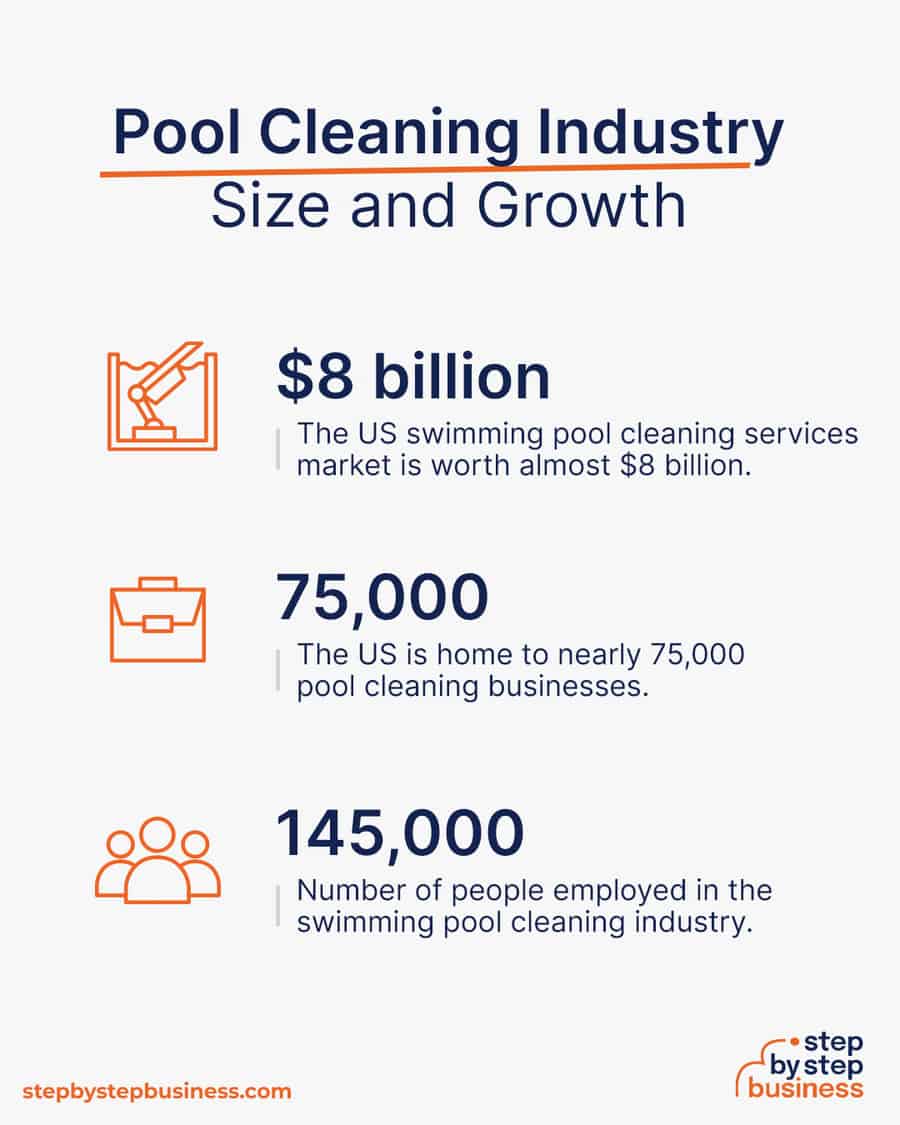
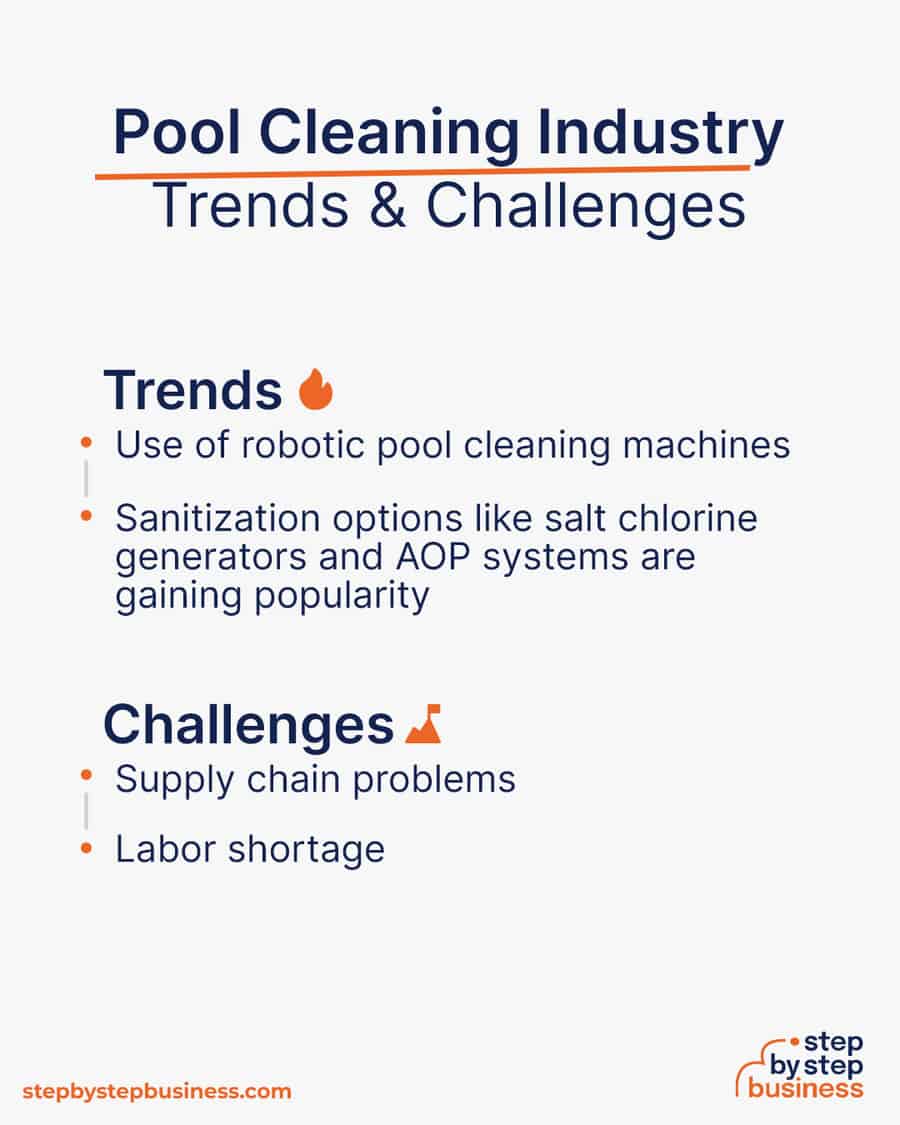
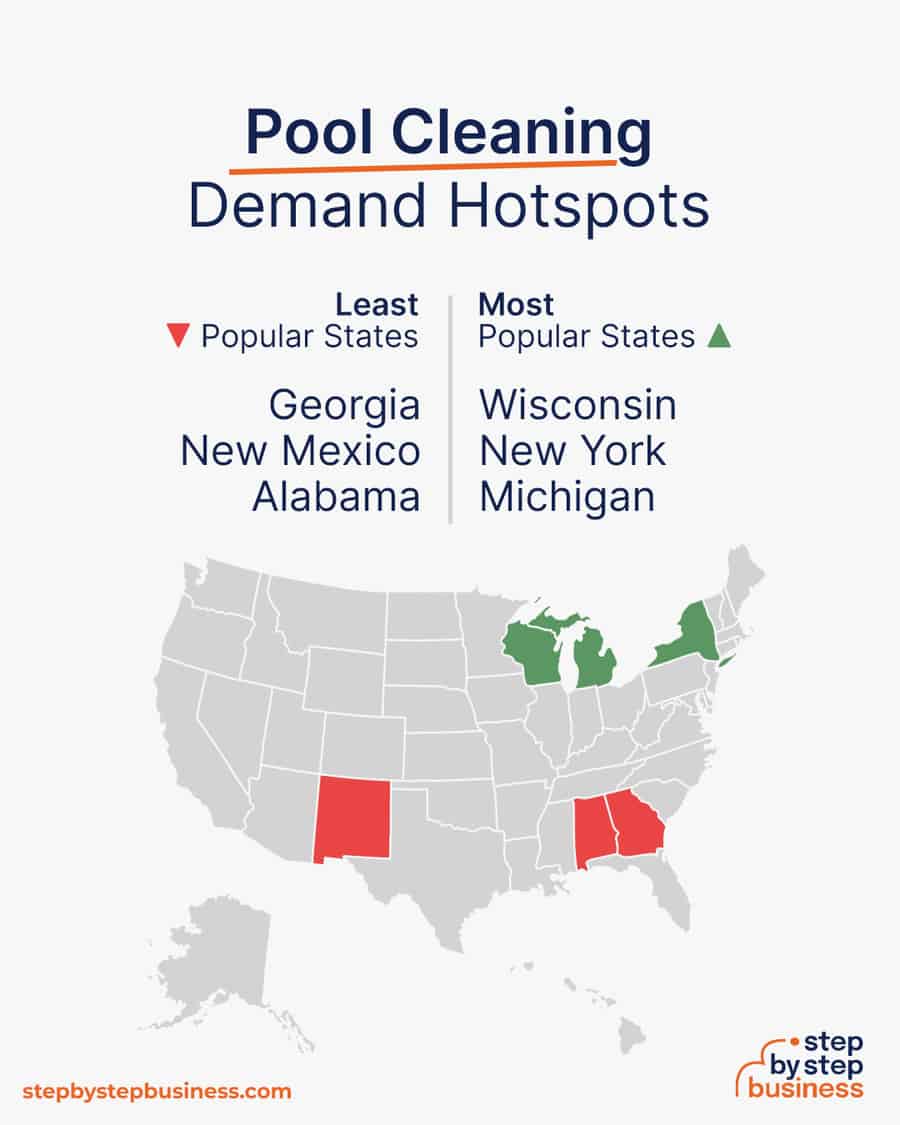
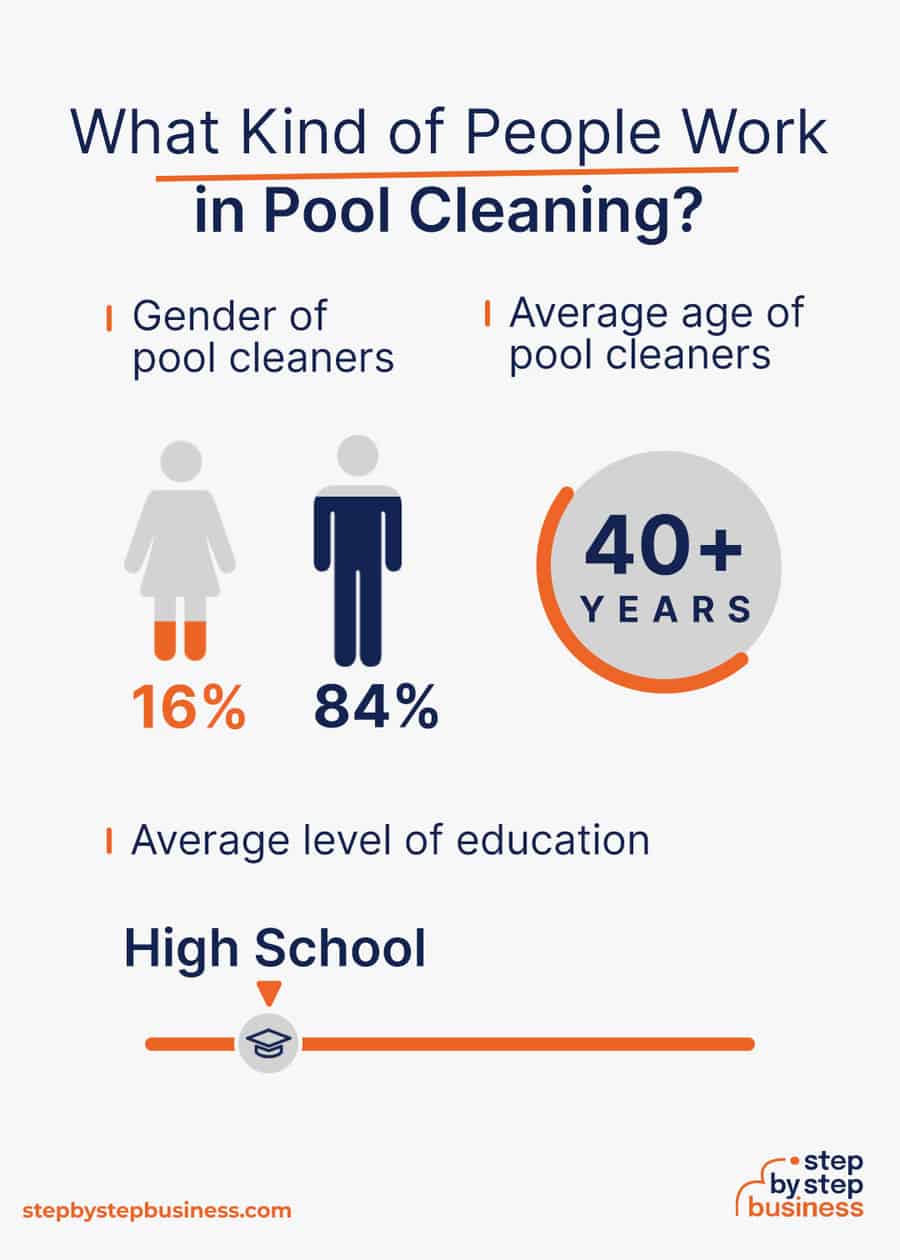
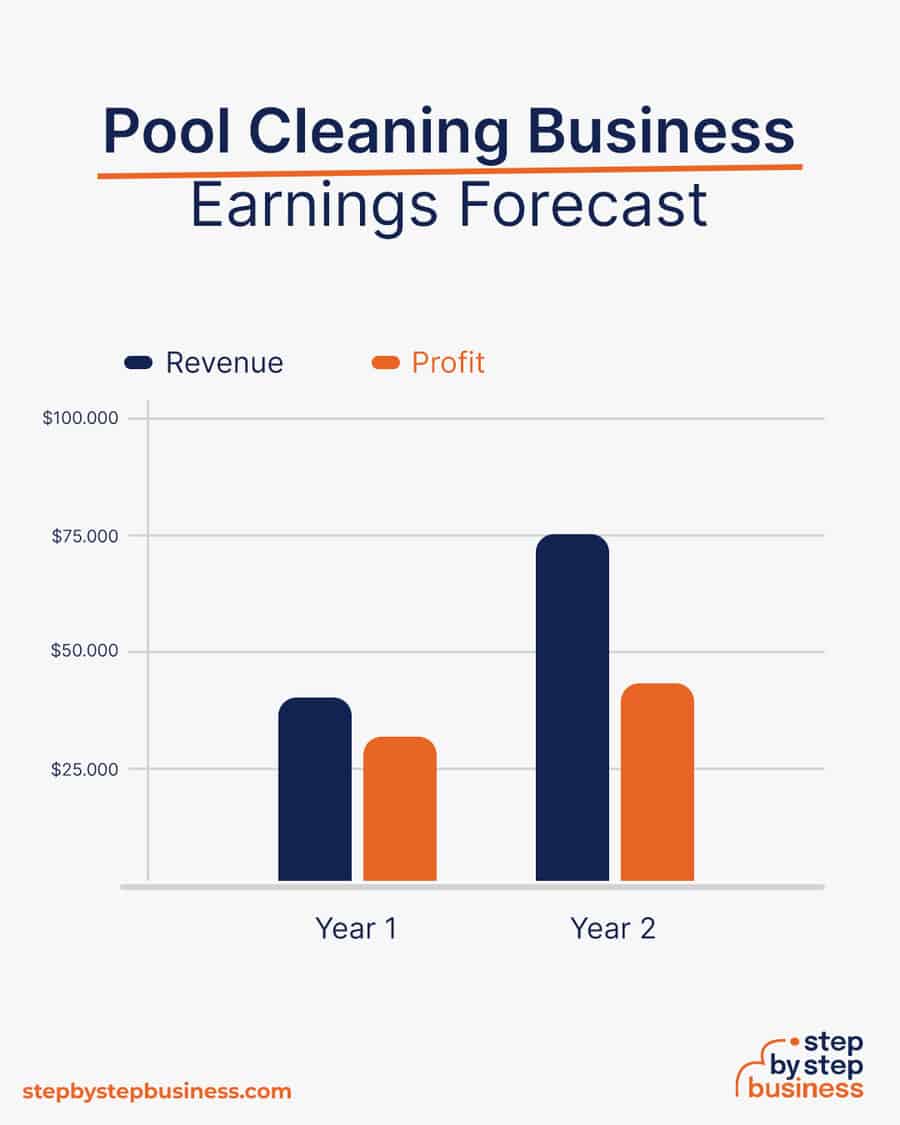




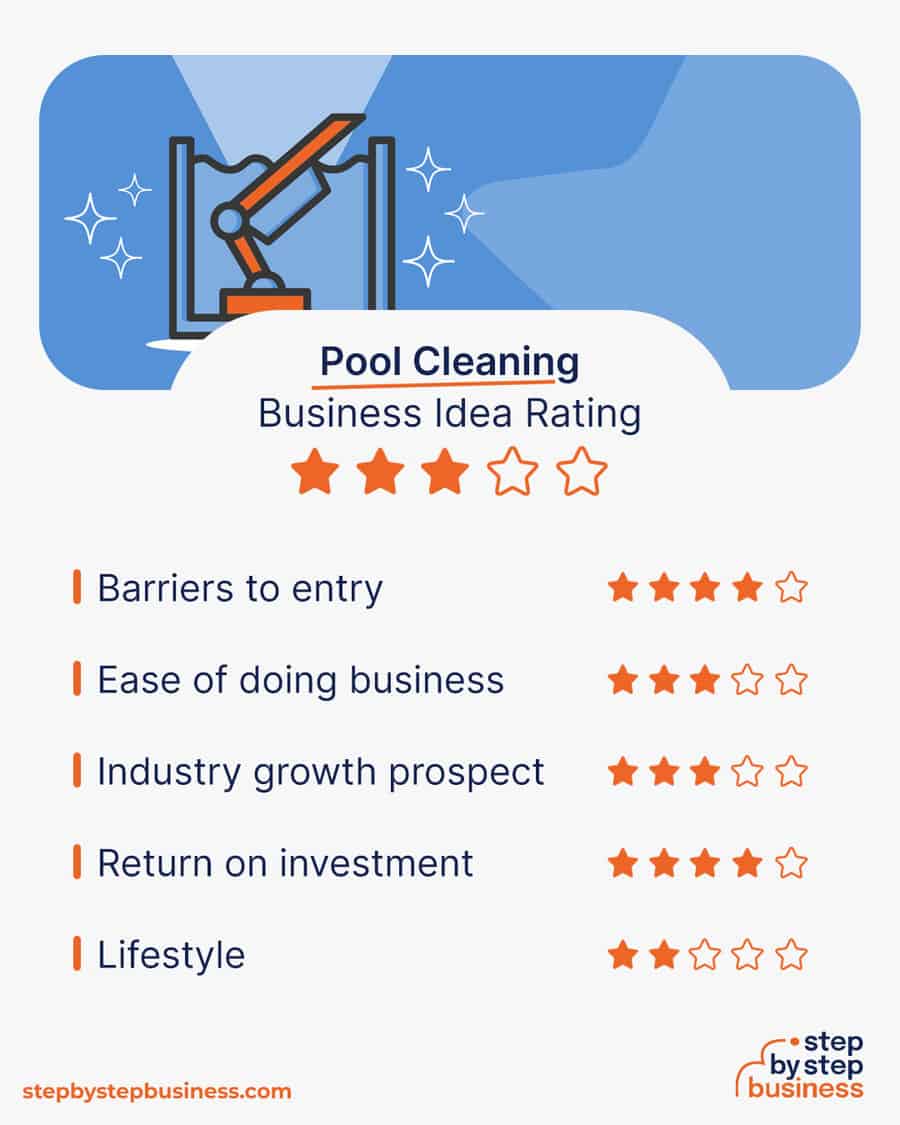











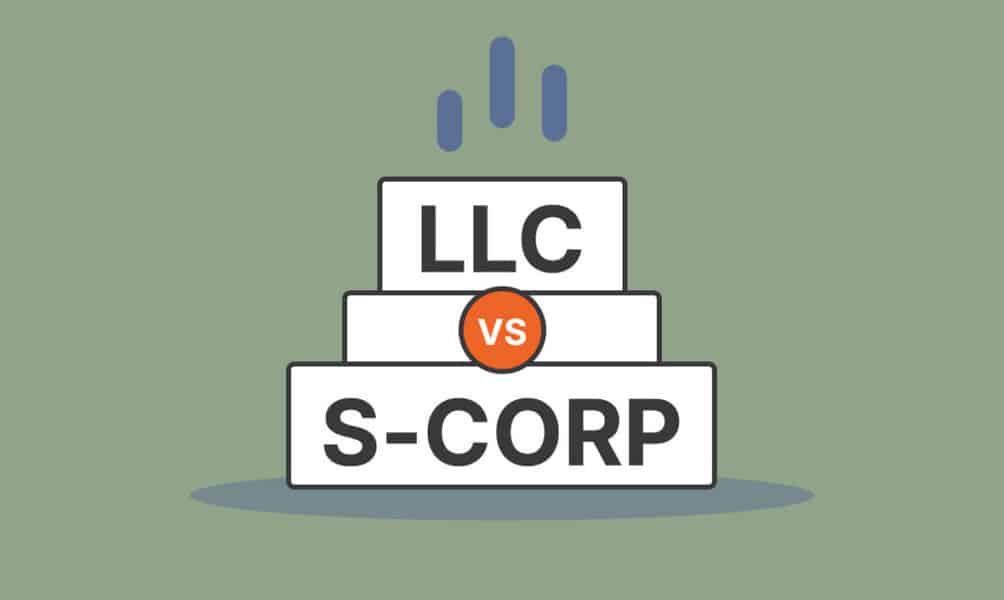

Comments